|
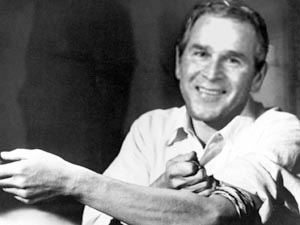 At
the end of our last episode, we learned that the principle that
government has a central role to play in the economy implies a
fourth principle -- that democracy must be widespread within the
continental system in order to prevent government from rapidly
accumulating power to the point that it destroys everything in its
path. After all, what I called the “neoimperial” philosophy, the
joining of “neoliberal” ideas about the perfection of the market,
with “neocon” ideas, advocating that one must use the military to
intimidate or take over as much of the world as possible, is the
philosophy of unrestrained power. Corporations unrestrained, working
hand-in-hand with militarism unrestrained, is actually the
definition of a much older word: fascism. Real democracy is
the opposite of fascism. At
the end of our last episode, we learned that the principle that
government has a central role to play in the economy implies a
fourth principle -- that democracy must be widespread within the
continental system in order to prevent government from rapidly
accumulating power to the point that it destroys everything in its
path. After all, what I called the “neoimperial” philosophy, the
joining of “neoliberal” ideas about the perfection of the market,
with “neocon” ideas, advocating that one must use the military to
intimidate or take over as much of the world as possible, is the
philosophy of unrestrained power. Corporations unrestrained, working
hand-in-hand with militarism unrestrained, is actually the
definition of a much older word: fascism. Real democracy is
the opposite of fascism.
Global Warning
The two weeks between August 28, the anniversary of the flooding
of New Orleans, and September 11, are a time for reflecting on two
possible futures, one catastrophic, the other hopeful.
On the one hand, Katrina and its aftermath were a prelude to the
inevitable effects of global warming: according to Gore’s book and
movie, An Inconvenient Truth, Shanghai and Calcutta,
lower Manhattan and Florida, will eventually go the way of the lower
Ninth Ward of New Orleans. On September 11, 2001, Osama bin Laden
and George W. Bush began a dance of death, each unleashing
destructive forces that the other can use to further the cause of
yet more destruction. The catastrophes of August 28 and
September 11 were made possible by oil, one by heating up the
atmosphere, the other by giving the combatants the economic and
military resources to spin their opportunistic web.
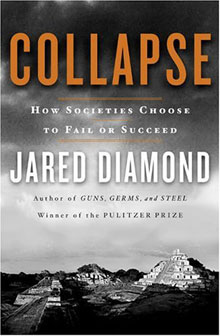
On the other hand, it should be clear that an alternative vision
of the future needs to be articulated, because otherwise we are
doomed to a future of war and ecological catastrophe. Such was the
fate of the Easter Islanders, a lesson told most recently by Jared
Diamond in his book Collapse. The rich and powerful on
that remote island seem to have destroyed their fragile environment
in selfish efforts to outshine each other by putting up
progressively larger and more environmentally expensive statues; as
the ecosystems collapsed, war convulsed the island. As Diamond
laconically writes about this and other examples of collapse, being
powerful only conferred the opportunity to be the last to starve to
death.
Democracy, New and Improved
Had this article been a TV show, as the title suggests, the
advertisers would be now pulling the plug, because a brooding public
does not shop (or so they suspect, even if, as usual, they don’t
really know what motivates people). But wait! There is
hope! For as the faithful reader may be aware, the first two
installments of this series[1] argued for three
principles of a global makeover:
1) Economies are continental, not global
2) Manufacturing and machinery are at the
center of a continental economy
3) Governments must be stewards of the
manufacturing economy.
At the end of our last episode, we learned that the principle
that government has a central role to play in the economy implies a
fourth principle -- that democracy must be widespread within the
continental system in order to prevent government from rapidly
accumulating power to the point that it destroys everything in its
path. After all, what I called the “neoimperial” philosophy, the
joining of “neoliberal” ideas about the perfection of the market,
with “neocon” ideas, advocating that one must use the military to
intimidate or take over as much of the world as possible, is the
philosophy of unrestrained power. Corporations unrestrained,
working hand-in-hand with militarism unrestrained, is actually the
definition of a much older word: fascism.
Real democracy is the opposite of fascism. Fascism is a
political structure of both politics and economics; power is
concentrated in the corporate sphere as well as in the political
domain. Therefore, in order to flourish, democracy must inhere
in both the economy and polity. When political democracy
coexists with economic tyranny, all of the energy of a vigilant
public must be applied in order to prevent the government from
slipping into the dictatorial tendencies from which democracies
emerged. One can point to the efforts of the Populists and
Progressives a century ago, the union movements of fifty years ago,
and the effects of a feeble Left in the U.S. today.
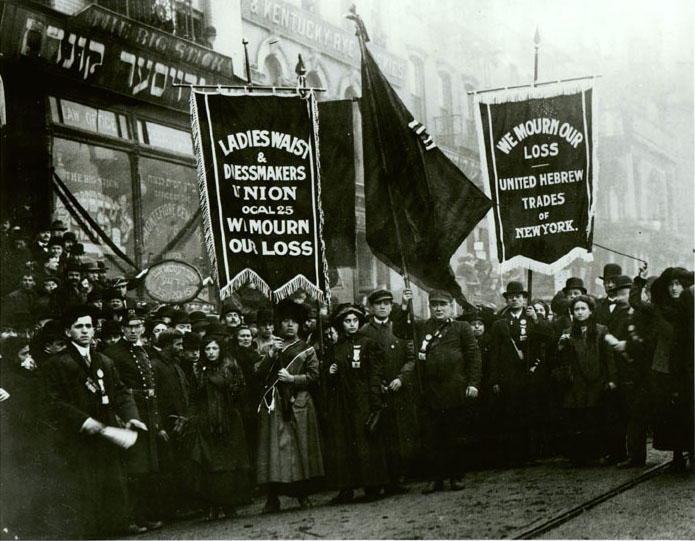
What is economic democracy? The most basic answer is: workplace
democracy, that is, firms that are owned and operated by their
employees as a whole. Workplace democracy for the firm achieves what
political democracy accomplishes for a nation; the individuals
making up the governing elite can be replaced by other individuals
chosen by the population. This has a beneficial effect on the
machinery of government, the bureaucracy, who are given rules and
commands by the elite.
In a kingdom, the king literally reproduces himself. In
both a corporation and a Communist country, a group of people,
either the board of directors or the Politburo, respectively, select
as their replacements only those who are directly concerned about
the interests of the elite. The difference can be represented
schematically in the following way:
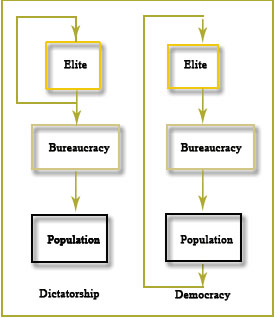
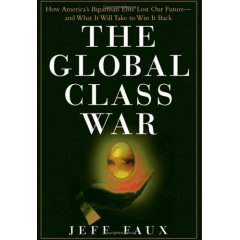
If GM and General Electric were owned and operated by their
employees, why wouldn’t they push the U.S. government to pursue the
same corporate-driven policies, such as lobbying for NAFTA, the WTO,
less taxes for the rich, and support for a huge military-industrial
complex. The current corporate elite are driven by a high
level of class consciousness and belief in class warfare, and the
constituents of democratically elected officials would not be
tolerate such selfish behavior.
The coarse nature of the current elite can be summarized in an
anecdote provided by Jeff Faux in his book Global Class War
. Faux was giving a group of steel executives a rundown of the
destructive consequences of the Reagan administration for their
industry. When an executive protested that they knew all this,
an exasperated Faux asked them, why did they support Reagan?. “You
have to understand”, Faux quotes the executive, “He cut our
taxes. And we’re a country club crowd.”[2]
Remaking Mondragon 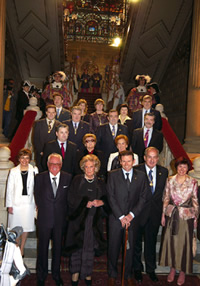
The most sophisticated example of workplace democracy is in the
Mondragon part of the Basque region of Spain,[3]
and one cannot imagine the
heads of the various firms of the Mondragon system of cooperatives
behaving like the “country club crowd”. At the center of the
Mondragon system is a bank, which allows the over 100 employee-owned
and controlled firms to operate without being pressured by the
mainstream financial establishment. In addition, the bank provides
technical and managerial assistance to the various member firms.
There is no public stock for Mondragon firms. When an employee, who
is really a co-owner, leaves, his or her share of the firm stays
with the firm. An economy made up exclusively of Mondragon-style
cooperatives would have no stock market, that is, no trading of
equities for a firm.
Workplace democracy is a democratic solution at the firm, or
micro level, but what about the economy-wide, or macro level?
The Mondragon example again shows a way to proceed. For each
major metropolitan subregion of a continental economic system, a
public industrial development bank could be established, which would
be controlled by a combination of elected officials from the region
and by member firms, with some representation from the employees of
the bank. For instance, in the U.S. the Federal Government
provides statistics for consolidated metropolitan statistical areas,
or CMSAs, such as the greater New York City area (encompassing much
of northern New Jersey and southern New York). One could
envision neighborhood or town development banks within each CMSA,
culminating in a CMSA-wide bank, with members appointed by mayors
and Congresspeople, and some members elected by the population as a
whole.
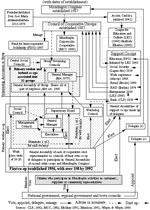
Another alternative would be to have each Congressional district
be the domain of a bank, with the bank board headed by the
Congressperson of the district. The advantage of this scheme would
be to achieve for an industrial bank system what the
military-industrial complex achieves for the military -- a political
machine with built-in support from local interests. Each bank, in
either scheme, would be staffed with people who could help
entrepreneurs to create new businesses, to expand existing ones, and
to help firms work together to achieve economies of scale.
A bank whose regional task would be to coordinate firms across
industries would be particularly effective for rebuilding and even
transforming the physical infrastructure. In the United
States, the physical infrastructure is deteriorating, as Katrina
made clear. In order to avoid global warming and other environmental
catastrophes, as well as to head off the chaos of the end of the era
of cheap oil, it is imperative to transform the energy and
transportation infrastructures, world-wide. This would be made
easier if there was a network of industrial and infrastructure banks
helping to coordinate and finance the effort.
Brought to you by 99% of the population
For various reasons, corporate and political global elites do not
care about the long-term well-being of the global economy and
environment. People in employee-owned firms who would vote for
boards of directors of their local firms would be much more attuned
to the long-term environmental and economic problems of their
regions than would global elites. Global elites can always move
their assets from one devastated area to another, and stay rich and
powerful. Local people cannot. Unless they are starving,
locals tend not to pursue actions that turn their local environments
into deserts. They also don’t want their firms to close and be moved
abroad.

It is useful to model global elite behavior as similar to the
behavior of heroin addicts. No one would trust a heroin addict
to pass up a large sum of money that they could convert into heroin
in the short term so that they might have more money in the
long-term. So it is, that with rare exceptions, global elites
cannot pass up a greater share of power and money – for instance,
lower taxes – even if it means possible Katrinas in the future.
Similarly, one would not expect them to stay clear of the corruption
of the occupation of Iraq, even if it means possible September 11’s
in the future. The 99% plus of the population who are not members of
the global elite are not tempted to destroy their own region in
pursuit of power, simply because most people cannot thereby obtain
greater power. Instead, most people must remain concerned with the
problems of time and space, the long-term health of their economy
and environment in the space in which they live. For global elites,
space and time virtually does not exist, only power does. While
co-owners of a democratic firm may be tempted to lobby for
destructive policies, they also must consider their own
region. In fact, an economy that was made up of employee
cooperatives could probably get away with less government regulation
because the firms could be depended on to act more according to the
long-term interests of the whole society.[4]
The tale of the U.S. points to one more necessary element of
economic democracy – public ownership of resources. All across
the globe, governments have nationalized oil, for instance.
Companies that act like money junkies cannot be expected to mine,
drill, fish, log, or farm the planet in a sustainable manner.
The resources of the Earth must be treated as long-term assets, and
short-term market thinking has to be limited as much as possible in
this case, by the state if necessary. At least if a
democratically elected government controls natural resources, there
is a chance that a concerned public can draw on those resources in a
sustainable manner
America’s democracy deficit
Workplace democracy, regional development banks, and economy-wide
governmental stewardship and ownership of resources would go a long
way toward the goal of economic democracy. Political
democracy, unfortunately, is not altogether healthy in the United
States, where the power of corporate money is tearing away at the
foundations of democracy. In Japan the fact that electoral
districts have not been changed since the end of World War II helps
explains its semi-authoritarian politics, rooted in a minimization
of urban power. Because of the Electoral College in
presidential elections and the existence of the Senate, urban power
in the U.S. is also shortchanged. The European Union has a
“democratic deficit” because of the convoluted way its elites are
appointed.
One way of making over the political structure of most continents
would be the following: Each continental region would have two
legislative chambers of the same size that would jointly elect a
head of state.
- One chamber would be territorial, based on population, such as
the U.S. House of Representatives.
- The other would be chosen according to proportions received by
political parties, as many European parliaments are chosen
today.
In such a way, each small region would elect a government
official who would represent and fight for local interests, and at
the same time, the proportional legislative chamber would enable the
views of many political parties and viewpoints to be heard.
The King and U.S.
The United States has shown that a large, powerful nation with an
independent king-like President is a recipe for disaster.
Hopefully, the republic will survive, even though the son of one
President is now the occupant of the White House and acts like his
namesake, the king of England, when last a king had American
colonies.
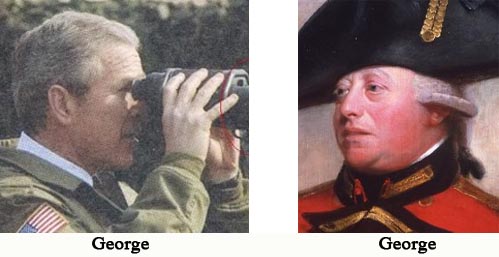
George W. Bush joins Richard Nixon and Ronald Reagan as recent
grave threats to the United States (and the world). Perhaps
the founders of this country, who were much more attuned to world
history than the current power holders, would appreciate that the
President is beginning to resemble the proconsuls and dictators of
ancient Rome, who were also elected for fixed terms, leading to the
fall of the Roman Republic. The huge military and intelligence
apparatus that has been built up since World War II provides too
tempting a target to the power junkies of the American elite.
U.N.-likely?
Let’s imagine that the world is composed of continentally-based
political and economic systems, that firms are democratic, political
systems are modernized and manufacturing is considered a priority of
government. We still have the problem of improving the lives
of most of the world’s population so that they are not close to
starvation, but at the same time avoiding a world that would be too
hot for the dinosaurs. Long-term global problems require the
action of a global, democratically elected entity. So let us
imagine a United Nations whose Security Council is permanently made
up of elected representatives from each of the nine continental
systems that I proposed in the first episode of “Extreme Makeover,
Global Edition”. The General Assembly could have two chambers,
one regionally based, the other proportional, both of which would
elect a Secretary General. Such a body could have the
following powers and responsibilities:
1) Stewardship and co-control of world parks,
which would include huge areas such as the Amazon rain forest,
large parts of Africa, Borneo, and most of the area of the world’s
oceans
2) Environmental regulatory power such as the
right to ban or significantly reduce certain chemicals, control
over fishing, and the ability to ban or limit agricultural or
other activity that threatened the sustainability of soils,
forests, or water
3) Establishment of inter-continental
transportation networks of rail, and regulation of airline
activity, including subsidization of tourism, in order to
encourage multicultural understanding as well as nondestructive
ecotourism
4) A transformed IMF and World Bank that
would help continents to become sustainable manufacturing and
technology centers, with the World Trade Organization merged with
the International Labor Organization, based on labor and
environmental standards, not free trade
5) A military force that could prevent
genocide and civil war,[5] which would have to operate
in conjunction with the institutions set up for 4), in order to
eliminate the long-term causes of such conflicts.
I said this was an alternative vision, not a short-term policy
agenda.
You can contact Jon Rynn directly on his jonrynn.blogspot.com .
You can also find old blog entries and longer articles at
economicreconstruction.com. Please feel free to reach him at
This email address is being protected from spam bots, you need
Javascript enabled to view it
.
Notes
[1] Extreme
Makeover, Global Edition, Episode
One, and Extreme Makeover, Global Edition, Production Episode
Two .
[2] Jeff Faux, The
Global Class War, 2006, p. 75.
[3]
The classic treatment
is William Foote Whyte and Kathleen King Whyte, Making Mondragon:
The growth and dynamics of the worker cooperative complex,
Cornell Institute of Industrial and Labor Relations Press, 2nd
edition, 1991.
[4]
I would like to
thank Brian D’Agostino for making this point.
[5]
This has actually been
proposed, see the following link
. |








 At
the end of our last episode, we learned that the principle that
government has a central role to play in the economy implies a
fourth principle -- that democracy must be widespread within the
continental system in order to prevent government from rapidly
accumulating power to the point that it destroys everything in its
path. After all, what I called the “neoimperial” philosophy, the
joining of “neoliberal” ideas about the perfection of the market,
with “neocon” ideas, advocating that one must use the military to
intimidate or take over as much of the world as possible, is the
philosophy of unrestrained power. Corporations unrestrained, working
hand-in-hand with militarism unrestrained, is actually the
definition of a much older word: fascism. Real democracy is
the opposite of fascism.
At
the end of our last episode, we learned that the principle that
government has a central role to play in the economy implies a
fourth principle -- that democracy must be widespread within the
continental system in order to prevent government from rapidly
accumulating power to the point that it destroys everything in its
path. After all, what I called the “neoimperial” philosophy, the
joining of “neoliberal” ideas about the perfection of the market,
with “neocon” ideas, advocating that one must use the military to
intimidate or take over as much of the world as possible, is the
philosophy of unrestrained power. Corporations unrestrained, working
hand-in-hand with militarism unrestrained, is actually the
definition of a much older word: fascism. Real democracy is
the opposite of fascism.





